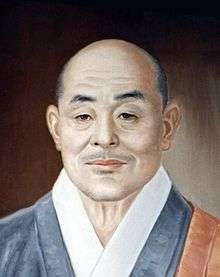Kobong
Kobong soensanim (Korean: 고봉선사, Hanja: 高峯禪師, 1890–1962),[1][2] the 77th Patriarch in his teaching lineage, was a Korean Zen master.
Kobong / 고봉 / 高峯 | |
|---|---|
 | |
| Title | Zen master |
| Personal | |
| Born | 1890 |
| Died | 1962 |
| Religion | Buddhism |
| School | Chogye (Seon) |
| Senior posting | |
| Predecessor | Man-gong |
| Successor | Seungsahn |
| Kobong | |
| Hangul | 고봉 |
|---|---|
| Hanja | 古峰 |
| Revised Romanization | Gobong |
| McCune–Reischauer | Kobong |
| Birth name | |
| Hangul | 박경욱 |
| Hanja | 朴景昱 |
| Revised Romanization | Bak Gyeonguk |
| McCune–Reischauer | Pak Kyŏnguk |
Biography
At an early age, Kobong became a monk at Namjangsa.[2] Known for spontaneous and eccentric teaching,[1][3] he sometimes said that he preferred to teach laypeople because monks were too lazy to practice hard.[4][5]
Kobong never held a position at any temple or established a temple of his own.[6] When he was elderly, his student Seungsahn brought him to Hwagyesa[6] in Seoul, South Korea where Kobong died at the temple in 1962.[5] A large granite monument was built in his honor on the hillside overlooking Hwagyesa.
Lineage
Kobong Sunim was Dharma heir to Mangong Sunim, who was in turn Dharma heir to Kyongho Sunim. Kobong Sunim's best known student was Seungsahn Sunim (1927–2004), founder of the Kwan Um School of Zen. Seungsahn Sunim received Dharma transmission from Kobong Sunim at 22 years of age. Kobong had never given inka to any monk before he met Seungsahn Sunim[2] and Seungsahn remained his only dharma heir.[5]
Sunim is a Korean word that means ordained Buddhist and can refer to both men and women who have taken ordination vows.
See also
References
- "Ko Bong". Sweeping Zen. Archived from the original on 30 March 2014. Retrieved 16 April 2013.
- "Ko Bong Sunim". Chogyesa Zen Temple of New York. Retrieved 16 April 2013.
- "Korean Zen: Ko Bong". Ox Herding. Retrieved 16 April 2013.
- "Ko Bong's Try Mind". Kwan Um School of Zen. Retrieved 16 April 2013.
- "Zen Master Ko Bong". Mu Sang Sa. Archived from the original on 4 July 2013. Retrieved 16 April 2013.
- "Flower Valley Temple The Story of Hwa Gye Sah". Retrieved 16 April 2013.
External links
- Kobong Holds a Ceremony
- 36,000 Mornings, Kobong's Enlightenment Story by Zen Master Seung Sahn
- Kobong's Wild Dharma Scenes & Broken Precepts by Zen Master Seung Sahn
- Ko Bong Sells a Cow by Zen Master Seung Sahn at the Wayback Machine (archived February 24, 2004)